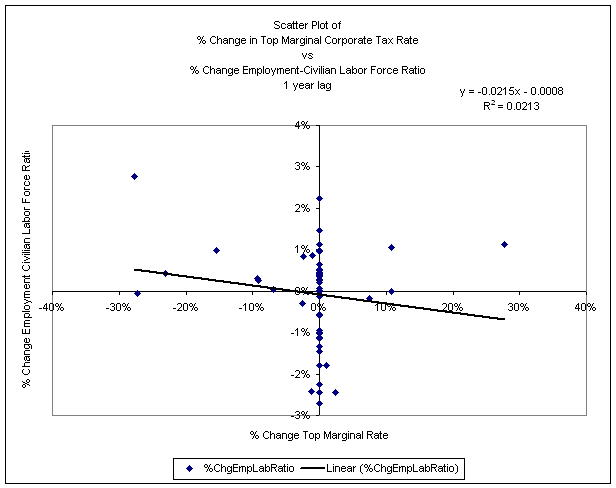itfitzme
VIP Member
I've been looking for some sort of measure that would prove it. It took a while, but I finally found one. Once I found it, it became so obvious it was down right laughable. (If someone would check my math, I'd appreciate it. Sometimes, in the excitement, I can make an error.)
This is how economic proof work. We start with the hypothesis that supply side economics works. We define some sort of measure.
A measure that works is the correlation between the percentage change in the employment-civilian labor force ratio and the percentage change in the top marginal corporate tax rate.
The idea being that lowering the top marginal rate will cause employment to go up. So a negative percentage change in the top marginal rate would cause a positive percentage change in the employment-civilian labor force ratio.
So, if supply side economics works, then the two will be negatively correlated.
One simple way to see a correlation is a scatter plot. When there is a correlation, a scatter plot will show the data points all lined up.
Here is a scatter plot of the two with a one year lag time. This is the strongest correlation that can be obtained.

That straight line, sloping downward, proves that supply side economics works.
That R^2 number is a measure of how much of an effect it has. It says that 2% of the variability is caused by a change in the top marginal corporate tax rate.
The equation y=-.0215x-.0008 says that the (% change in the employment-CFL ratio) = -0.0215 * (% Chg Top Marginal Rate).
If we decrease the top marginal rate by 50%, then employment will go up by .0215 * 50 = 1.075%.
That's how that work. And it proves that supply side economics works. Of course, correlation doesn't prove causality. But the causality is obvious.
The current corporate top marginal rate is 35%. The current employment-CLF ratio is 90.3%.
We can get from the current 90.3% employment to 95% employment by lowering the corporate tax rate by 4.7/.02 = 235%. That will obviously work. It is so obvious when you think about it. There is no possible argument against it.
The current rate is 35%. So we can lower it to 35% - 235% = - 200%. All we have to do is raise income taxes. Then we can pay companies at a 200% rate on every dollar they make.
That is, after all, what we are saying. We shouldn't be punishing companies for making money by taxing them. We should be rewarding them.
All we need to do is give every company $200 for ever $1 in profit and they will be creating jobs and product like gangbusters. In fact, it makes absolute sense that we could completely eliminate unemployment entirely this way. We would kick Ireland's ass. Every company now manufacturing in China would be setting up shop in the U.S. within a couple of years.
So, eat that you socialist liberals.
This is how economic proof work. We start with the hypothesis that supply side economics works. We define some sort of measure.
A measure that works is the correlation between the percentage change in the employment-civilian labor force ratio and the percentage change in the top marginal corporate tax rate.
The idea being that lowering the top marginal rate will cause employment to go up. So a negative percentage change in the top marginal rate would cause a positive percentage change in the employment-civilian labor force ratio.
So, if supply side economics works, then the two will be negatively correlated.
One simple way to see a correlation is a scatter plot. When there is a correlation, a scatter plot will show the data points all lined up.
Here is a scatter plot of the two with a one year lag time. This is the strongest correlation that can be obtained.

That straight line, sloping downward, proves that supply side economics works.
That R^2 number is a measure of how much of an effect it has. It says that 2% of the variability is caused by a change in the top marginal corporate tax rate.
The equation y=-.0215x-.0008 says that the (% change in the employment-CFL ratio) = -0.0215 * (% Chg Top Marginal Rate).
If we decrease the top marginal rate by 50%, then employment will go up by .0215 * 50 = 1.075%.
That's how that work. And it proves that supply side economics works. Of course, correlation doesn't prove causality. But the causality is obvious.
The current corporate top marginal rate is 35%. The current employment-CLF ratio is 90.3%.
We can get from the current 90.3% employment to 95% employment by lowering the corporate tax rate by 4.7/.02 = 235%. That will obviously work. It is so obvious when you think about it. There is no possible argument against it.
The current rate is 35%. So we can lower it to 35% - 235% = - 200%. All we have to do is raise income taxes. Then we can pay companies at a 200% rate on every dollar they make.
That is, after all, what we are saying. We shouldn't be punishing companies for making money by taxing them. We should be rewarding them.
All we need to do is give every company $200 for ever $1 in profit and they will be creating jobs and product like gangbusters. In fact, it makes absolute sense that we could completely eliminate unemployment entirely this way. We would kick Ireland's ass. Every company now manufacturing in China would be setting up shop in the U.S. within a couple of years.
So, eat that you socialist liberals.
Last edited:



